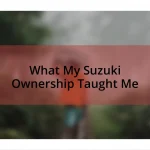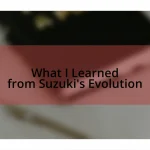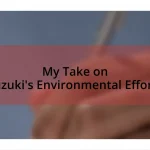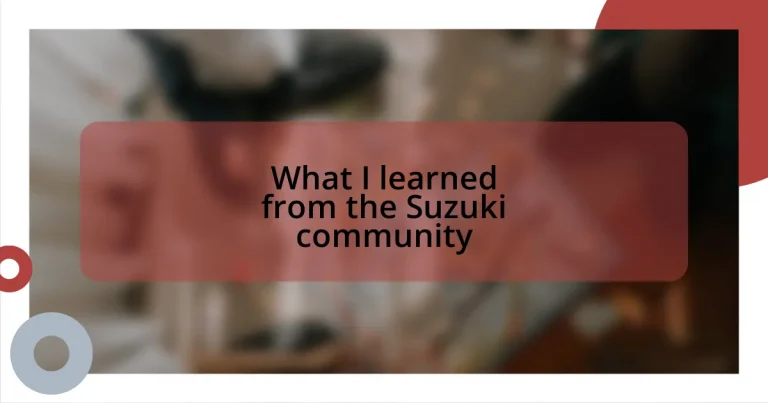Key takeaways:
- The Suzuki philosophy promotes the belief that all children can learn music, emphasizing joy in practice and a nurturing environment.
- Collaborative learning experiences foster resilience and community, turning individual challenges into shared successes.
- Consistent practice and celebrating individual progress build confidence and a love for music, transforming challenges into opportunities for growth.
- Parent involvement in lessons enhances the learning experience, creating shared purpose and excitement in children’s musical journeys.
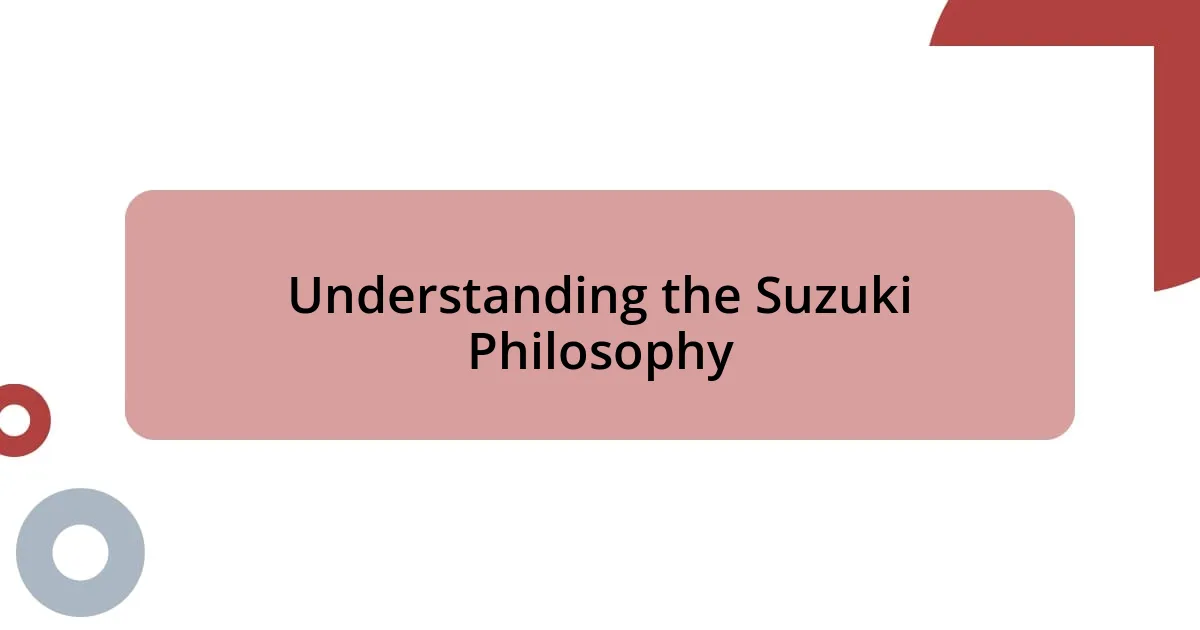
Understanding the Suzuki Philosophy
The Suzuki philosophy is rooted in the belief that every child is capable of learning music. I remember when I first encountered this idea; it resonated deeply with me. It’s empowering to think that potential isn’t limited to the gifted but is available to every child, encouraging an inclusive environment that nurtures each individual’s talents.
Another core aspect of Suzuki’s approach is the emphasis on the importance of practice, not just as a means to an end, but as a joyful journey. I often reflect on my own practice sessions, where I learned that the process of improving was often more rewarding than the final performance itself. Don’t you find that, too? When we focus on the joy of playing and expressing ourselves, the love for music naturally grows.
Additionally, the Suzuki philosophy promotes learning in a natural way, much like how we acquire our native language. It makes me smile to recall moments where I listened to music and absorbed it, akin to how children mimic conversations around them. Isn’t it fascinating how our environment plays such a significant role in our development? This holistic approach not only cultivates skilled musicians but also nurtures compassionate individuals who appreciate the beauty of collaboration and community.
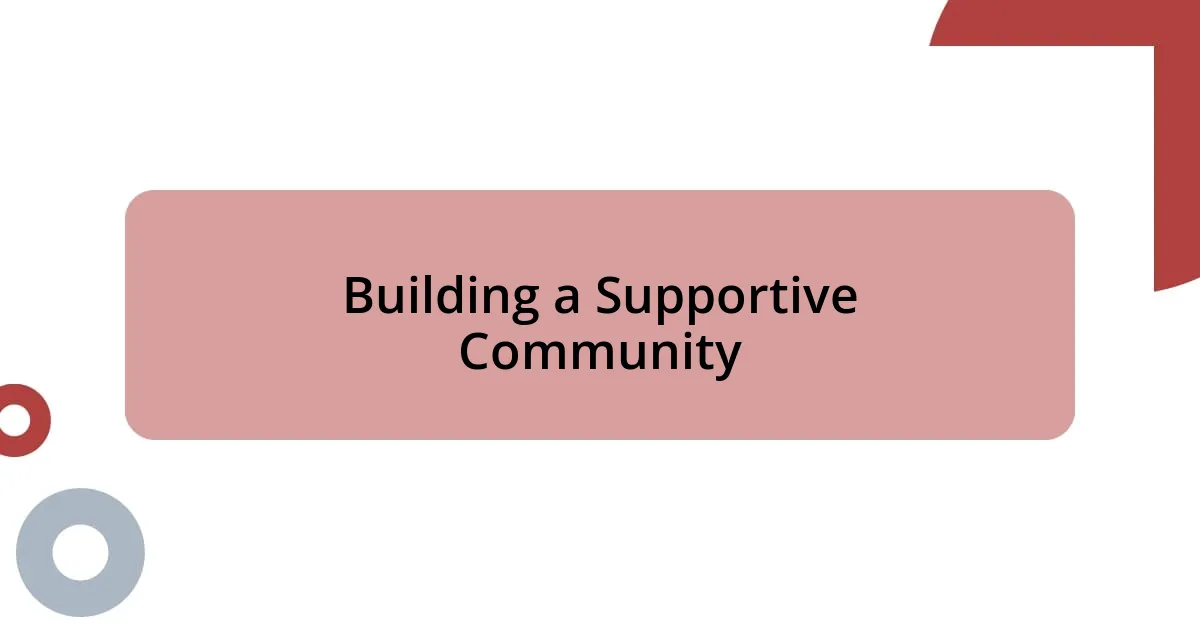
Building a Supportive Community
Building a supportive community within the Suzuki framework is like creating a nurturing garden where every student can flourish. In my experience, the sense of belonging I felt among fellow Suzuki parents and teachers was transformative. We celebrated not just our children’s milestones but each other’s journeys as well.
- Regular group classes allowed us to share strategies and support each other.
- I found that exchanging resources and tips helped demystify challenges.
- Collaborative performances became opportunities for our kids to shine together, fostering friendships that extended beyond music.
I’ll never forget the time we organized a potluck after a recital. The joy and laughter shared around the food fostered relationships that went deeper than just music. It reminded me that our community wasn’t just about perfecting a piece; it was about sharing experiences and growing together as families.
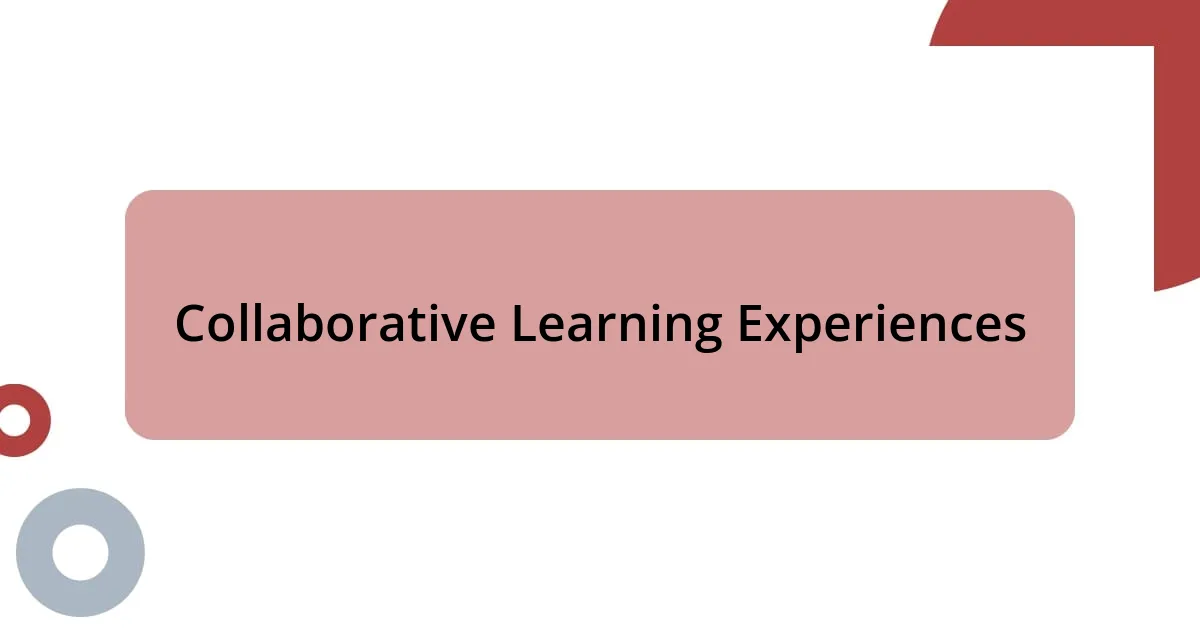
Collaborative Learning Experiences
Collaborative learning within the Suzuki community has a unique charm that often takes you by surprise. I vividly recall my first group lesson; the atmosphere buzzed with excitement and shared purpose. Watching the children play in unison brought a sense of connection that I hadn’t experienced before. It was a powerful reminder that learning music is not just an individual journey but a communal one, where every note played echoed the collective effort of the group.
The beauty of these collaborative experiences is in the way they foster growth and resilience. I remember a particular moment when my child struggled with a piece during a group session. Instead of feeling alone, support enveloped us from every corner. Peers offered tips, and even cheerful encouragement sparked a renewed determination. It’s incredible how collaboration can transform challenges into opportunities. This interconnectedness instilled a real sense of camaraderie, turning personal hurdles into shared triumphs.
Engaging with others in such a supportive environment is invaluable. I often reflect on the performances we held, where students showcased their skills in a casual setting, reducing their anxiety and building confidence. The laughter and applause from families created a joyous atmosphere that lifted everyone’s spirits. These collaborative experiences have not only enhanced our musical abilities but have forged bonds that last far beyond the music itself.
| Collaboration Elements | Personal Experience |
|---|---|
| Group Lessons | First group lesson felt electric; shared joy in playing together. |
| Peer Support | Child received encouragement during challenges, fostering resilience. |
| Community Performances | Performances turned into joyful celebrations, creating lasting bonds. |
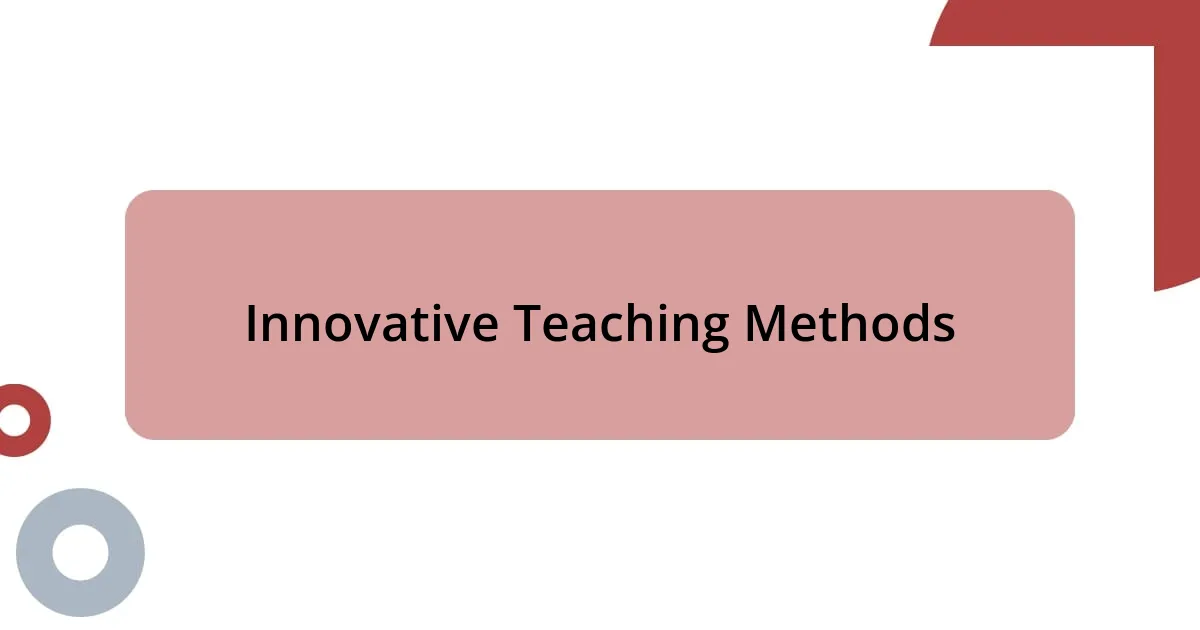
Innovative Teaching Methods
The innovative teaching methods gleaned from the Suzuki community profoundly shaped my perspective on learning. One standout technique is the emphasis on repetition and mastery over perfection. I remember watching my child revisit the same piece multiple times, not just to nail every note but to infuse it with emotion and expression. This practice made me wonder—what if we applied this idea to other areas of life, allowing room for growth without the pressure to excel instantly?
Another fascinating approach is the concept of learning by ear. Initially, I felt skeptical about this; after all, how does one grasp the intricacies of music without reading notes? However, seeing my child effortlessly picking up melodies and improvising taught me the power of listening. This method not only built confidence in musical interpretation but also deepened their connection to the music. Have you ever considered how much more freedom there is in understanding music without the constraints of written instructions?
Finally, the integration of parent involvement in lessons was both innovative and empowering. I vividly recall participating during one of my child’s sessions, and it was exhilarating! Being part of the learning process not only strengthened our bond but also turned practice into a fun, shared experience. It’s remarkable how active involvement can transform a learning environment, creating a shared sense of purpose and excitement. Who would have thought that I would gain as much from my child’s lessons as they did?
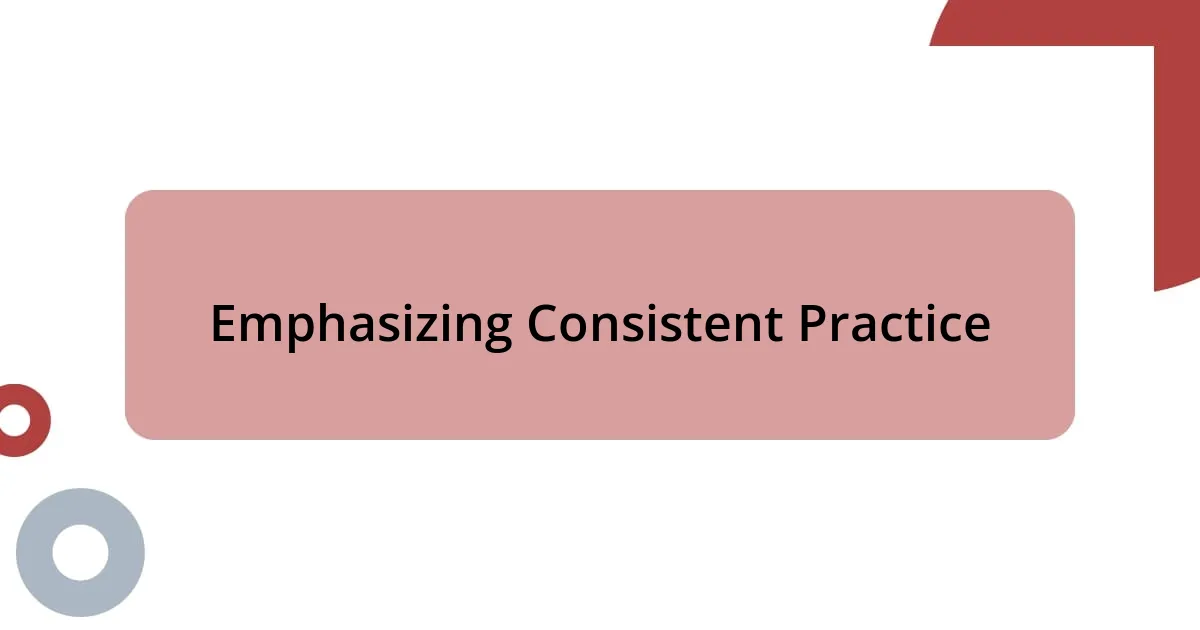
Emphasizing Consistent Practice
One of the key insights I’ve gained from the Suzuki community is the profound impact of consistent practice. I still remember those early days when my child practiced diligently each evening, sometimes grumbling about the repetition. But over time, I saw how that commitment transformed frustration into fluidity, as muscles learned the movements and confidence grew. It made me realize how essential it is to embrace consistency—not just in music, but in any skill we want to develop. Have you ever considered how small daily efforts can lead to unexpected breakthroughs?
There was a time when my child faced a particularly stubborn piece of music, and the urge to quit was palpable. Instead of letting that negativity take over, we made a game out of these practice sessions. I introduced small rewards for achieving minor milestones, turning the experience into something to look forward to each day. The joy of progress outweighed the monotony, and soon, that once-agonizing piece flowed effortlessly. This experience reinforced a vital lesson: that practice, even in seemingly tedious forms, can be reimagined to make it enjoyable and fulfilling.
In reflecting on this journey, I’ve come to appreciate how integral consistent practice is to building resilience. When children see tangible improvements from their effort, it empowers them to tackle challenges head-on, whether in music or life. I learned that there’s magic in the little victories we celebrate together—those moments where perseverance shines through create a lasting impact. Do you recall a time when persistence transformed a challenge into a triumph for you? That’s the heart of what I’ve learned in the Suzuki community about the value of dedication.
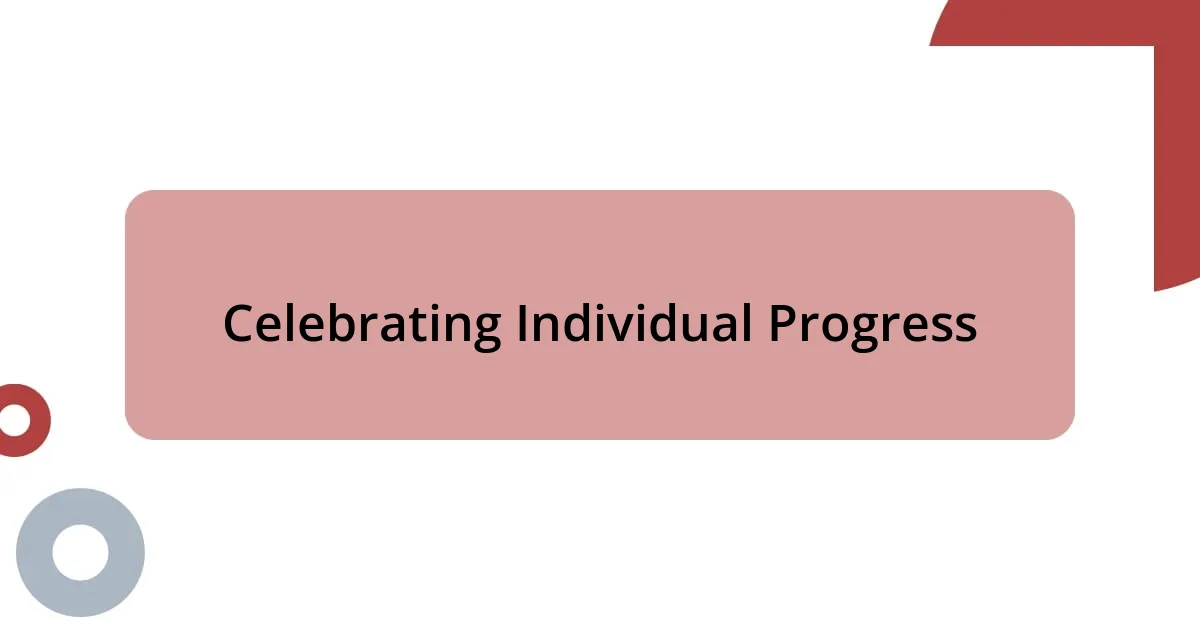
Celebrating Individual Progress
In the Suzuki community, celebrating individual progress has become a cornerstone of our musical journey. I’ll never forget the moment my child decided to play a piece for the family, their face lighting up with pride during the performance. Though the notes weren’t flawless, the joy and energy carried through every chord, reminding us all that each small achievement deserves acknowledgment. How often do we recognize the effort behind our accomplishments instead of just the results?
One day, after weeks of practice, my child mastered a tricky passage that had caused frustration and tears. We decided to throw a mini ‘celebration’ in the living room, complete with snacks and a round of applause. This not only boosted my child’s confidence, but it also reinforced the idea that progress isn’t solely about hitting the right notes; it’s about embracing and honoring the journey. Isn’t it fascinating how a simple celebration can foster a love for learning and reinforce positive associations with hard work?
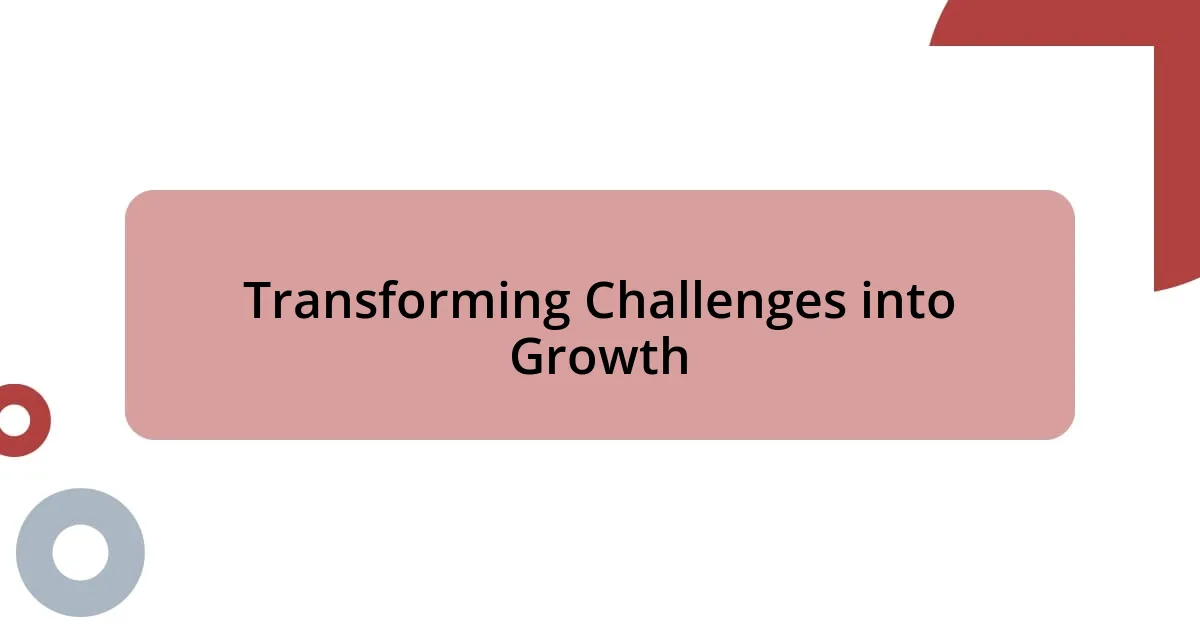
Transforming Challenges into Growth
Challenges often feel overwhelming, but embracing them can be a powerful catalyst for growth. I remember a time when my child struggled with stage fright before a recital. Instead of pushing them to confront it alone, we took a step back and turned it into a family project. We practiced public speaking games, and slowly, they transformed anxiety into excitement. Have you ever noticed how reshaping fear into playful preparation can make a world of difference?
As we navigated these hurdles together, I learned that each setback is simply a stepping stone to self-discovery. One particularly challenging week, my child faced criticism during a group lesson, which initially shattered their confidence. But instead of letting this discourage them, we reframed the experience as an opportunity for growth. They began to see that feedback isn’t an endpoint but rather a roadmap for improvement. Isn’t it empowering to realize that what feels like a setback can often lead to new breakthroughs?
This journey has taught me that transforming challenges requires a mindset shift. I recall a moment when my child tackled a complex piece that seemed beyond their grasp. Instead of focusing solely on the end goal of perfection, we celebrated every little success along the way: the first perfect measure, the first time playing without looking at the music. This approach not only made practice more enjoyable but also nurtured resilience and patience. How often do we overlook the power of incremental progress in the face of monumental challenges? By cherishing those tiny victories, I’ve seen firsthand how frustrations can morph into profound growth, echoing the very spirit of the Suzuki philosophy.

